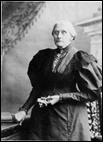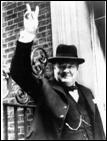December 2009
Throughout history human beings have been the beneficiaries of heroic actions, most frequently those of an outstanding individual taking a committed stand regardless of the conventional status quo, the accepted tradition or the cultural norm. Such stands have included boldness, courage, foresight, strength of character, passion, maturity, compassion and other traits we’ve seen in people who have changed our lives forever. In the West, these include the likes of Susan B. Anthony, Martin Luther King, Jr., Winston Churchill, Florence Nightingale, Nelson Mandela, Jonas Salk and many others.
Anthony, Mandela and Churchill
We have been conditioned to seek leaders who can fill those heroic slots for us, leaders who are capable of taking strong committed stands in the tradition of World War II heroes Churchill and Roosevelt, civil rights heroes Anthony, Mandela and King and medical heroes such as Nightingale and Salk. But democracies have gotten used to electing prospective political superheroes and then sitting back and critiquing their performance – not too dissimilar to the way people engage in detailed Monday morning post-mortems of the weekend’s sporting events, often leveling criticism at their heroes.
In recent years, we have entered a window whereby our society has become too complex for any one person, or even small group of persons, to effectively manage much less correct it when a malfunction occurs. We are finding ourselves in situation after situation in which no one person can remedy things, where problems seem more and more unsolvable, at least if we approach them as we have conventionally – finding the “right” leader who is capable of taking corrective action.
For many Americans, Barrack Obama was that man in 2007 and 2008. He expressed himself articulately and with confidence, giving hope to tens of millions, particularly young people and those who had previously dropped out of the political process. Obama the candidate then became Obama the President, sitting smack dab in the middle of one of the most complex, powerful and dysfunctional systems ever created by human beings. The system we know as the U.S. government is made up of so many different special interests, so many ambitious wannabes and private agendas, so much bureaucracy, so much history and precedent, that making any material change occur exceeds even the superhero capabilities Americans and many elsewhere in the world wanted to bestow on Obama.
Our systems have become so much more powerful than the ability of any one person or small group of people that they have become our monsters. Healthcare, climate change, education, the economy, our legal systems and government are all monsters who have become more powerful than their creators. Like Frankenstein, we have created creatures who now dominate us instead of serving us as we originally intended.
So, is the situation hopeless? Shall we resort to cynicism, resigned to being slaves to these creatures, and give up trying to improve things? Shall we merely settle for doing the best we can get under the circumstances, like accepting the breadcrumbs and accumulating the most toys? How can we bring about the course corrections so necessary in today’s world of runaway dysfunction and mediocrity?
As far as I can see, there is only one way out of this mess. We need to learn how to work together and be our own superheroes. If we cannot learn to resolve our differences and work collaboratively for the common good, if we continue to campaign for our “one and only truth,” if we insist on having it our way and ignoring the needs and wants of others, we are doomed to the future we are headed for – one of extreme polarities, ever-widening chasms of differences, our systems becoming even more dysfunctional to the point of collapse and, perhaps, even extinction. Not a pretty picture!
Let’s quit reading those comic books and having visions of Superman or Wonder Woman ridding our world of evil and defending the just and the good. Let us grow up and assume responsibility for the messes we have created and clean them up together, as mature adults working for the common good, the global commons on which we depend. It is either do this or end up like those Easter Islanders who are only known because they left some really big stones to remind the world they once existed.
When the Obama campaign generated that powerful motto “Yes we can!” it was more than a great slogan. ‘Yes’ affirms that we want change. ‘Can’ affirms our ability to make that change happen. And ‘we’ means all of us working to together to make that change happen. This is not just idealist rhetoric but absolute pragmatism. What is needed cannot be done by just the superheroes alone, not even Obama, unless we all pitch in and stop our adolescent squabbling and start working for the common good of all.


